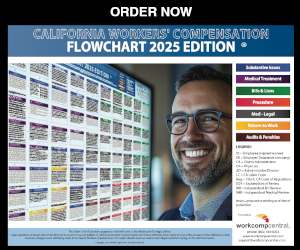Industry Insights
July 18, 2022
Geaney: ESA Not a Payment for Disputed Claim
- State: New Jersey
- - 0 shares
The case of Donald Servais v. Ocean Wholesale Nursery LLC. presents an unusual legal issue in workers’ compensation.

John H. Geaney
The case involved a dispute about an employment separation agreement and whether it could have been construed to constitute a payment of workers’ compensation benefits, thereby tolling the statute of limitations.
Donald Servais suffered an amputation of three fingers of his right hand on Jan. 26, 2016. No claim petition was ever filed within the two-year statutory period, and respondent never paid any workers’ compensation benefits to Servais, believing that the injury occurred at petitioner’s home and that petitioner was not an employee.
Respondent hired petitioner as a consultant and not as an employee, although petitioner contended that over the course of five years, his relationship with Ocean Wholesale Nursery LLC changed to that of an employee. Petitioner ultimately filed a formal claim petition on Oct. 26, 2018, well past the two-year statute of limitations.
Respondent, as insured by Farm Family Insurance Co. and administered by ESIS, filed a motion to dismiss the claim petition under the two-year statute of limitations. Petitioner countered by raising an argument regarding an employment separation agreement signed on Jan. 31, 2017, by both parties by which terms respondent paid $5,000 to petitioner to resolve their business relationship. Petitioner argued that the employment separation agreement was ambiguous and could have led petitioner to believe that the $5,000 payment was in part a payment for the loss of his fingers. Petitioner argued that the claim petition was filed within two years of the date of signing the employment agreement and was therefore timely filed.
The parties agreed to try the issue of the statute of limitations separately and then reserve for a later trial all other issues, such as compensability and employment. The judge heard testimony from petitioner, the nursery’s owner and its former general manager. The judge reviewed the terms of the employment separation agreement and found Section 7 to be confusing.
That section excluded from the agreement “claims that may arise after the date (petitioner) signs this agreement.” The judge thought this language might lead petitioner to believe that any incidents that arose before he signed the agreement were included. The judge also found paragraph seven to be ambiguous because it excluded “(petitioner’s) rights to receive benefits for occupational injury or illness under the workers’ compensation law” but did not specifically mention a “traumatic injury.”
The judge acknowledged that there was no mention anywhere in the agreement of an injury to petitioner’s fingers but criticized it for not informing petitioner of his right to file a workers’ compensation claim.
Based on his interpretation of the separation agreement, the judge concluded that it included any and all claims, including the loss of fingers. The judge also found that petitioner was an employee and was injured during the course of employment, although he previously agreed that these issues would be held for a later hearing.
Finally, the judge apportioned $1,000 of the $5,000 paid under the separation agreement to the petitioner’s injury to his fingers.
Farm Family appealed to the Appellate Division, which reversed in favor of the insurer and vacated the substantial award to petitioner. The court said, “Reviewing the agreement de novo, we perceive no ambiguity. The plain language of the agreement expressly excluded petitioner’s workers’ compensation claim.”
The court added:
"Contrary to petitioner’s argument, paragraphs five and six of the agreement would not reasonably lead a person to believe that the $5,000 payment under the agreement was also a partial payment for his work-related injury because paragraph seven of the agreement, clearly entitled in bold ‘Exceptions,’ expressly stated that the release in the agreement did not ‘affect or limit’ his right to receive benefits for occupational injury under the Workers’ Compensation Law."
In the end, the Appellate Division held that petitioner failed to file his claim petition in time. The court also added that the judge of compensation had no right to apportion $1,000 of the $5,000 payment under the separation agreement to the loss of petitioner’s fingers.
The court said:
"The judge’s finding that $1,000 of the $5,000 payment of the agreement was payment for petitioner’s loss of fingers has no basis in the record evidence. The judge faulted the agreement for not addressing petitioner’s loss of his fingers and for failing to inform petitioner of ‘his right to file a workers’ compensation claim and his inability to waive same.’ Yet, in the agreement, petitioner did not waive his right to file a workers’ compensation claim. To the contrary, in the agreement, petitioner expressly reserved his right to file a workers’ compensation claim. He just didn’t do so timely."
The court concluded by reversing the order denying respondent’s motion to dismiss, and vacated the final judgment. The court did not reach respondent’s argument regarding denial of due process, given the decision to dismiss the case on the statute of limitations.
John H. Geaney is an attorney, executive committee member and shareholder with Capehart Scatchard, a defense law firm in New Jersey. This post appears with permission from Geaney's New Jersey Workers' Comp Blog.
Advertisements
Columns
- Montgomery: New DOL Billing Requirements 08/22/25
- CAAA: State Extends Safety Protections to Domestic Service Workers 08/20/25
- Zachry: A Leader in the Fight Against Opioid Abuse 08/18/25
- Kamin: Asking About Liens Against Compensation 08/15/25
- Snyder: Examine Your Process 08/14/25
- Paduda: California Comp Drivers, Part 2 08/13/25
- CAAA: DWC Fumbles UR Rulemaking 08/12/25
- Paduda: California Comp Drivers, Part 1 08/11/25
- Langham: Bias Is Pernicious 08/08/25
- CAAA: Workers Can't Wait for Heat Protection 08/06/25
- Montgomery: State's Mandatory E-Billing Process Arrives 08/04/25
- CAAA: Audit Exposes Deep Failures at Cal/OSHA 07/30/25
- Paduda: Work Comp Remains the Darling of P&C Industry 07/28/25
- Wroten: The Flip Side of Regulations 07/25/25
- Moore: Were We Right About Comp in 2022? 07/23/25
- Kamin: WCIRB Says Carriers Losing Money Due to Rising Costs 07/21/25
- Paduda: What's Happening in Golden State Work Comp? 07/18/25
- CAAA: Fireworks Warehouse Blast Exposes Flaws in Safety, Oversight, Accountability 07/16/25
- Gelman: Asbestos Ban Is a Win for Workers 07/14/25
- Snyder: Mediation Confidentiality 07/11/25
Now Trending
- Workers' Compensation News
-
Calif. WCAB:
Electronic Testimony Should Be
Permitted When Witness Unable to…
Posted on Aug 15, 2025
-
Calif. Deadline
for Recon Doesn't Implicate
Fundamental Jurisdiction, Is
Subject…
Posted on Aug 21, 2025James Witkop says: “Leave it to the 6th, which never grants writs, to get involved…”
-
Calif.
Appropriations Committee Sends
SIBTF, Felony Fraud Bills to
Suspense…
Posted on Aug 20, 2025
-
Calif.
Appropriations Committee Hears Comp
Bills…
Posted on Aug 19, 2025
-
Calif. Committee
Passes Uninsured Employer, Death
Benefit…
Posted on Aug 22, 2025
-
Calif. Bill to
Allow Review for Contract Disputes
Heads to Senate…
Posted on Aug 21, 2025
-
Va. Ultrasound
Technician Suffers Compensable
Psychological Injury From Patient's…
Posted on Aug 19, 2025
-
N.J. Custodian
Gets Award for Multiple Injuries,
but Not Total…
Posted on Aug 20, 2025
-
Pa. Employer
Liable for Penalties for Failing to
Pay…
Posted on Aug 21, 2025
-
Texas Agreement
Compels Arbitration for Wrongful
Death of Unborn…
Posted on Aug 21, 2025
Jobs
- Fully Remote - Workers Compensation Defense Attorney (LOS ANGELES)
- Staff Counsel, Workers Compensation
- Senior Attorney/Assistant Attorney 1/2/3 (NY HELPS) WCB Item #8000
- Legal Secretary/Receptionist
- WC Defense Attorney 1+ year experience - Nor Cal - Fully Remote
- Now Hiring - Workers Compensation Defense Attorney
- Administrative Assistant II Workers' Compensation Jobs
Upcoming Events
Aug 26, 2025
Claims Association of Greater
Join the Claims Association of Greater Chicago (CAGC) for a day of golf, networking, and fun at Th …
Sep 2-4, 2025
San Diego Elevate Workers' Com
We are thrilled to announce that Early Bird registration is OPEN for ELEVATE® 2025! This year's …
Nov 7, 2025
WIMAH 2025 Workers’ Compensati
Join Hawai'i’s premier workers’ comp event for expert insights, top-tier networking, and standout …
Social Media Links
c/o Business Insurance Holdings, Inc.
Greenwich, CT 06836




No Comments
Log in to post a comment